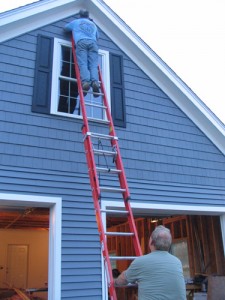How To Avoid Being Scammed
Avoid Home Repair Scams
 Every year thousands of people are scammed by dishonest contractors looking to make a quick buck. Every year I read stories in the news about scam artists who rip off home owners by selling services like roof and siding repairs and even driveway paving. Recently there was a local contractor charging elderly home owners thousands of dollars to pave driveways which he only “patched”.
Every year thousands of people are scammed by dishonest contractors looking to make a quick buck. Every year I read stories in the news about scam artists who rip off home owners by selling services like roof and siding repairs and even driveway paving. Recently there was a local contractor charging elderly home owners thousands of dollars to pave driveways which he only “patched”.
With the economy struggling it’s not surprising to hear that these kind of dishonest contractors are increasingly stealing from more and more people. However, these types of problems can be avoided if you take some simple steps to protect yourself.
How To Avoid Being Scammed
1. Understand The Scope Of Work
Before you hire a contractor to do any work at your home be sure you know what it is you’re going to hire them for. Create a detailed list (or scope) or work to be completed with specific details or specifications for materials and expectations.
2. Avoid Unsolicited Calls By Contractors
One of the first clues that you might be scammed by a contractor is calls or knocks on your door from unsolicited contractors. Most reputable contractors wait to be called by a customer and never go around knocking on doors looking for work. One of the oldest scams in the books are paving contractors knocking on your door saying they have “extra” or “leftover” pavement from a job down the road. They claim they will give you a great deal so they can empty their trucks. It’s fair to say that 99.9% of the time this is a cold call and a scheme meant to put you on the spot and try to rush you into a decision without getting other bids. Tell them to leave a quote and you’ll call them on another day to schedule after you get additional quotes. If they truly want your business they will do that and come back another day.
3. Ask For References
This is one of the most important steps in protecting yourself from a scam. If a contractor will not or does not give you references upon request then it’s likely they have something to hide. Better yet ask family and friends for references of good contractors they have used in the past. Nothing beats solid references when you’re trying to prevent being scammed.
Another great tip along this line is asking contractors vendors for a referral. Over at Charles & Hudson they recently wrote an article: Finding A Good Contractor: Do Their Suppliers Tolerate Them?. This is a great piece of advice because a contractor that doesn’t get along with his suppliers is likely to be in some type of financial distress that you won’t to avoid.
4. Get Estimates In Writing
Be sure to get at least three estimates for any project of significance. It’s very important that you get a written estimate with a date on it. This is the best way to compare your estimates and be sure each price is for a comparable scope of work.
5. Get The Details In Writing
This really goes hand and hand with #4 above but it’s worth saying again. It’s VERY important to get a written estimate along with a written scope of work. You should also sign a contract that specifies the payment terms along with a schedule and warranty for materials and workmanship. Being a contractor myself I want that signed contract as much as the customer should want it. It protects both parties and it’s the easiest way to avoid conflicts.
Take Your Time
Above all be sure to take your time when selecting a contractor for home repairs or construction. Call your local better business bureau, ask for references and be sure you hire local contractors that are insured and well known. If you take these easy steps you’ll be protecting yourself from dishonest contractors and scams.













Leave a comment